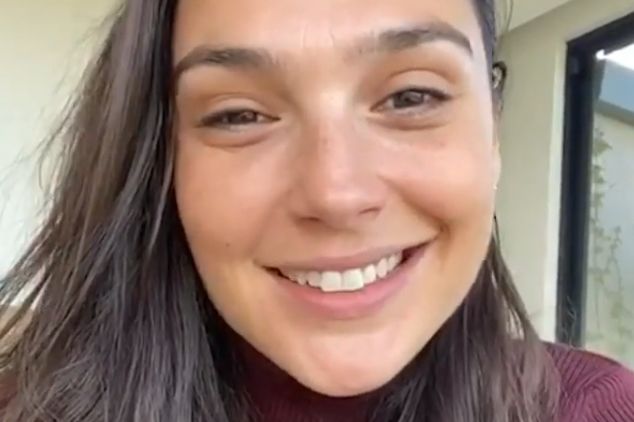Gal Gadot’s ‘Imagine’ Video Was The Beginning of the End


Exactly five years ago, the world united in squeamish horror against the dozen famous people who decided that the best way to deal with the rapidly worsening pandemic was to sing a John Lennon song on Instagram. Nobody wants to revisit the month of March 2020, but in honor of “Imagine‘“s wood anniversary, I bravely rewatched the entire three-minute video, which, to creator Gal Gadot’s credit, is still available to view on her Instagram page. Lest you’ve blocked this particular artifact of internet culture from your memory, it begins by Gadot sighing into her camera: “Hey guys, day six in self-quarantine, and I gotta say that these past few days got me feeling a bit philosophical.” The idea, she says, came to her after seeing a video of an Italian man playing “Imagine”on his balcony. “Doesn’t matter who you are, where you’re from, we’re all in this together,” she says before celebrities ranging from Zoe Kravitz to Mark Ruffalo break into stilted, broken song.
It’s still an excruciating watch, not least because of the hindsight that comes from knowing how much worse everything ultimately got. But despite the immediate, visceral backlash it received — for its smarm, for its tone-deafness, both literally and metaphorically, for its fundamental emptiness (what’s the point of rich people making it about themselves if they’re not contributing any money to solving the problem?) — there are some redemptive moments: James Marsden reminds us that he does in fact have a great voice. Sia and Leslie Odom Jr. really go for it in a way you sort of have to commend. Pedro Pascal is … there?
More than anything, though, the video is cringey not only because of its vacuity but because it recalls a distinctly 2010s era of social media, one when famous people simply being in the same room together was cause for universal applause. Consider Ellen DeGeneres’s star-studded 2014 Oscars selfie, which became the most reposted tweet in history despite being an ad for Samsung and was met with squeals of delight from the rest of the internet. There was still an element of novelty in celebrities coming together to show their “normal” side on Instagram and Twitter while simultaneously endearing themselves to audiences who found them more relatable than ever. That 2010s optimism continued past the 2016 election, when Hollywood’s A-list coalesced around preventing Trump from taking office, appeared at protests, and, most famously, popularized the Me Too movement.
Something changed the same month “Imagine” was released. Though more of us were spending our entire lives online than ever, just posting — it became clear — wasn’t enough. A few months later, when white celebrities and regular folks alike tried to express their support for Black Lives Matter in the wake of George Floyd’s murder, the deluge of blank black Instagram squares was almost immediately recognized as detrimental to the original cause, and the cutesy infographics and social-justice slideshows being shared en masse were criticized for the same reasons “Imagine” was.
Perhaps it’s not a coincidence that, in the five years since, disdain for celebrities — at least the traditional Hollywood class — has increased alongside a deep sense of nihilism over an individual’s power to resist the forces of technocracy or authoritarianism. Famous people have been notoriously quiet since Trump’s reelection, and no similar celebrity-led posting strategy emerged during the California wildfires or DOGE’s torpedoing of the federal government. Some who have spoken out on behalf of Palestinians have been fired or lost work. Even when celebs have attempted to influence elections, such as the many who stumped for the Harris campaign, it hasn’t resulted in much: At this year’s Golden Globes, Nikki Glaser joked, “You’re all so famous, so talented, so powerful. I mean, you could really do anything — except tell the country who to vote for.”
If there is a case to be made for “Imagine,” it’s that celebrities have maybe taken the wrong lesson from it — that it is better to say nothing than to risk being laughed at. Gadot has admitted in multiple interviews that the video was “in poor taste,” and at least three others attempted to distance themselves from the project shortly thereafter. Although it’s objectively a good thing that famous people have wised up to how, in times of crisis, nobody really wants to hear from them unless they’re willing to help materially, there’s something nostalgic about the idea that, at the very least, the rich and famous once pretended to care.
Update: An earlier version of this post contained language that could be deemed insensitive. That language has been removed.

Latest News
For Sale! 2016 Sea Ray 350 Sundancer – $180,000
Reel Deal Yacht is pleased to feature a meticulously maintained 2016 Sea...
Michigan quarterback Bryce Underwood displays growing pains and flashes of promise in spring game
Michigan quarterback Bryce Underwood showed glimpses of the growing pains he will...
Frustration follows yet another season after Sabres extend NHL-record playoff drought to 14 years
There were no feelings of satisfaction on Saturday, unlike the ones Sabres...
Westbrook fuels Nuggets’ comeback to edge Clippers 112-110 in OT in teams’ NBA playoff opener
Russell Westbrook, whose late-game follies hung over the Denver Nuggets as they...
Sanders has no time to enjoy moment of jersey ceremony for son, Hunter as he focuses on spring game
Deion Sanders didn’t get a chance to fully enjoy the moment as...













